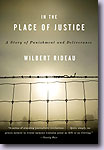

In the Place of Justice
Throughout history, prisoners have chronicled their experience behind bars, striving to illuminate society’┐Įs darkest
and most forgotten places through their own tales of struggle and suffering. But none has approached the task with the
courage, compassion and literary grace of Wilbert Rideau. Many inmates, confronted by the injustices that Rideau was
forced to endure over 44 years in the Louisiana State Penitentiary, would have simply railed against ’┐Įthe system’┐Į or
lashed out against their captors. Rideau, by contrast, sets out on a dangerous and deeply moving journey of transformation,
determined to atone for his crime in the only way that matters: by leading a life committed to both personal redemption
and institutional reform.
A ninth-grade dropout who kills a woman during a botched bank holdup, Rideau uses his years in solitary confinement on
death row to confront his own crime and educate himself about the broader world that has banished him. Then, as editor
of The Angolite, he uses his newfound knowledge on behalf of others, forging what would become not only the best
prison newspaper in America, but a model for journalists everywhere. Rather than succumbing to bitterness and hatred ’┐Į
or slavishly siding with prison officials to better his own chances for release ’┐Į Rideau turns the paper into a crusading
voice for fairness and justice. He takes readers deep inside the American penal system, repeatedly exposing its brutality,
racial bias and corruption through honest and determined reporting. At the same time, he uses the tale of his own case ’┐Į
one fraught with the racial politics of the Deep South ’┐Į to lay bare the separate and unequal legal system that has
outlasted Jim Crow.
For his reporting alone, Rideau has made a critical and lasting contribution to our understanding of a prison system that
long ago gave up on the notion of rehabilitation. But his memoir goes far beyond the limitations of journalism. He brings
to his story a deep devotion to the power of literature, drawing on traditions as diverse as St. Augustine and Frederick
Douglass to craft a dramatic and moving tale that is both deeply felt and richly observed. In refusing to be cast as a
cold-blooded murderer, Rideau never presents himself as a saint ’┐Į only as a man who, with all his flaws, manages to come
through the trials of life, including those he has inflicted on himself and others, and achieve something beyond his
personal freedom, something rare and wondrous: true salvation.
Excerpt
A heaviness settled on me, as it has before and will again ’┐Į a sense of death. My chest feels tight; I feel
cramped and smothered. I literally ache from despair. Long ago, a cruel world that regarded by ambitions as
insolence and my claim to equality as blasphemy ignited in me fires of frustration fueled by ignorance. I stand
in the ominous silence of this steel tomb and contemplate the utter destruction of life that followed ’┐Į my
victim’┐Įs, my family’┐Įs, my own. I agonize for what has been lost, what could have been. From this wreckage, I
will save something yet, though I cannot see how. I look at the books on my bunk. I know they are the keys to
keeping my sanity, and they are also my salvation. If I die here, I am not going to die an ignorant man. I am
going to learn something about the world and taste something of life before I leave it, if only through books.
And if I somehow survive this experience, I am going to need all the education I can milk from these books.
-Eric Bates, 2011 finalist judge
Executive Editor, Rolling Stone
|